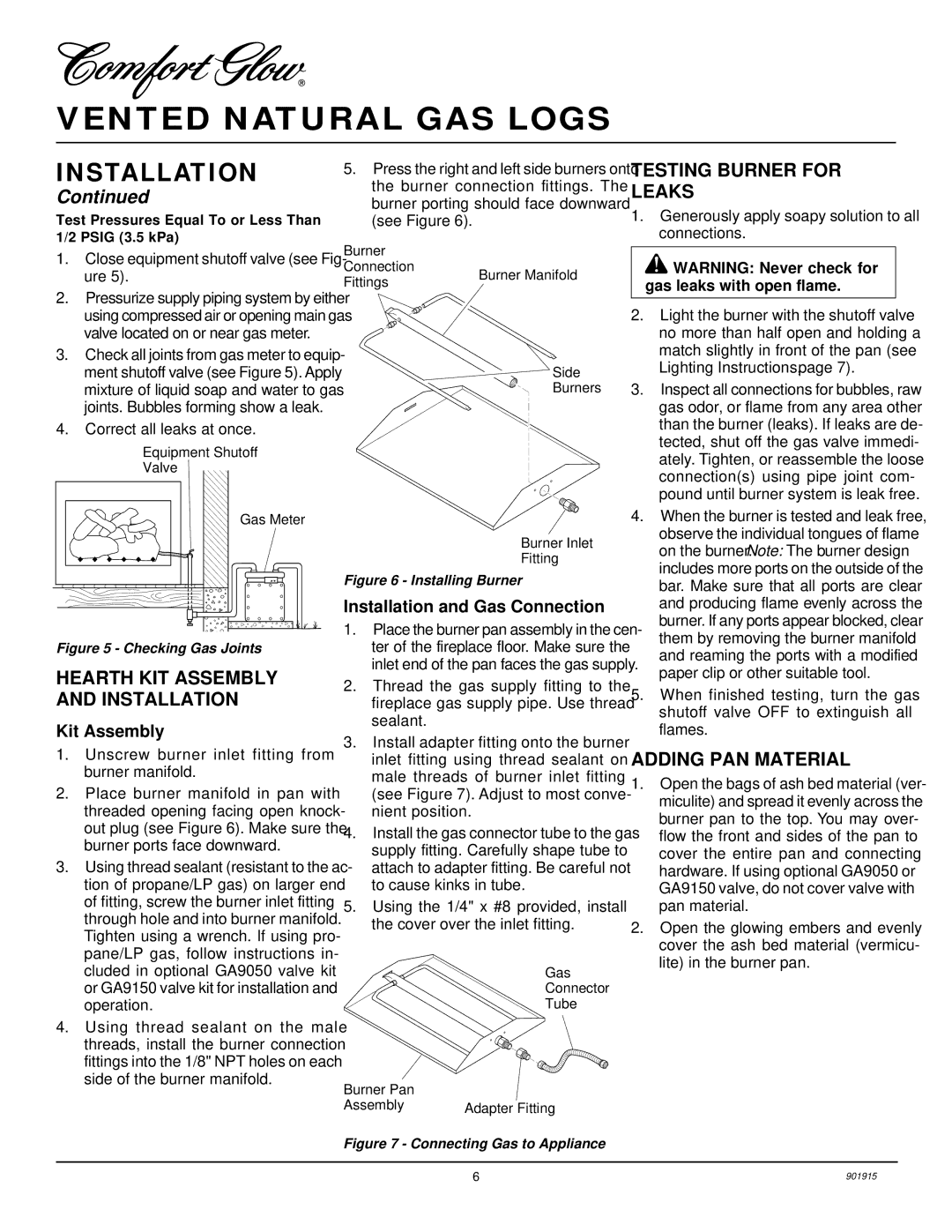
VENTED NATURAL GAS LOGS
INSTALLATION
Continued
Test Pressures Equal To or Less Than 1/2 PSIG (3.5 kPa)
1.Close equipment shutoff valve (see Fig- ure 5).
2.Pressurize supply piping system by either using compressed air or opening main gas valve located on or near gas meter.
3.Check all joints from gas meter to equip- ment shutoff valve (see Figure 5). Apply mixture of liquid soap and water to gas joints. Bubbles forming show a leak.
4.Correct all leaks at once.
Equipment Shutoff |
Valve |
Gas Meter |
Figure 5 - Checking Gas Joints
HEARTH KIT ASSEMBLY AND INSTALLATION
Kit Assembly
1.Unscrew burner inlet fitting from burner manifold.
2.Place burner manifold in pan with threaded opening facing open knock- out plug (see Figure 6). Make sure the burner ports face downward.
3.Using thread sealant (resistant to the ac- tion of propane/LP gas) on larger end of fitting, screw the burner inlet fitting through hole and into burner manifold. Tighten using a wrench. If using pro- pane/LP gas, follow instructions in- cluded in optional GA9050 valve kit or GA9150 valve kit for installation and operation.
4.Using thread sealant on the male threads, install the burner connection fittings into the 1/8" NPT holes on each side of the burner manifold.
5.Press the right and left side burners onto the burner connection fittings. The burner porting should face downward (see Figure 6).
Burner |
| |
Connection | Burner Manifold | |
Fittings | ||
|
Side
Burners
Burner Inlet
Fitting
Figure 6 - Installing Burner
Installation and Gas Connection
1.Place the burner pan assembly in the cen- ter of the fireplace floor. Make sure the inlet end of the pan faces the gas supply.
2.Thread the gas supply fitting to the fireplace gas supply pipe. Use thread sealant.
3.Install adapter fitting onto the burner inlet fitting using thread sealant on male threads of burner inlet fitting (see Figure 7). Adjust to most conve- nient position.
4.Install the gas connector tube to the gas supply fitting. Carefully shape tube to attach to adapter fitting. Be careful not to cause kinks in tube.
5.Using the 1/4" x #8 provided, install the cover over the inlet fitting.
Gas
Connector
Tube
Burner Pan |
|
Assembly | Adapter Fitting |
Figure 7 - Connecting Gas to Appliance
TESTING BURNER FOR LEAKS
1.Generously apply soapy solution to all connections.
![]() WARNING: Never check for gas leaks with open flame.
WARNING: Never check for gas leaks with open flame.
2.Light the burner with the shutoff valve no more than half open and holding a match slightly in front of the pan (see Lighting Instructions, page 7).
3.Inspect all connections for bubbles, raw gas odor, or flame from any area other than the burner (leaks). If leaks are de- tected, shut off the gas valve immedi- ately. Tighten, or reassemble the loose connection(s) using pipe joint com- pound until burner system is leak free.
4.When the burner is tested and leak free, observe the individual tongues of flame on the burner. Note: The burner design includes more ports on the outside of the bar. Make sure that all ports are clear and producing flame evenly across the burner. If any ports appear blocked, clear them by removing the burner manifold and reaming the ports with a modified paper clip or other suitable tool.
5.When finished testing, turn the gas shutoff valve OFF to extinguish all flames.
ADDING PAN MATERIAL
1.Open the bags of ash bed material (ver- miculite) and spread it evenly across the burner pan to the top. You may over- flow the front and sides of the pan to cover the entire pan and connecting hardware. If using optional GA9050 or GA9150 valve, do not cover valve with pan material.
2.Open the glowing embers and evenly cover the ash bed material (vermicu- lite) in the burner pan.
6 | 901915 |
